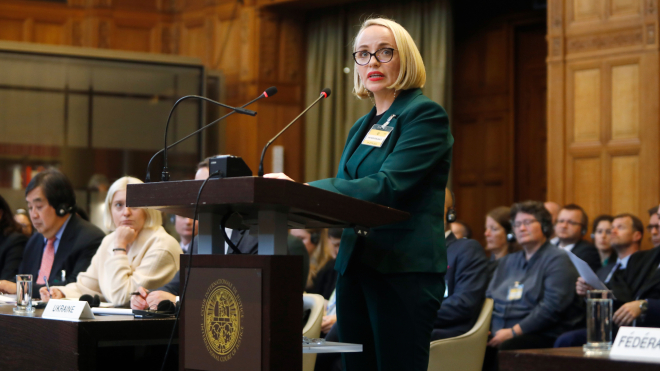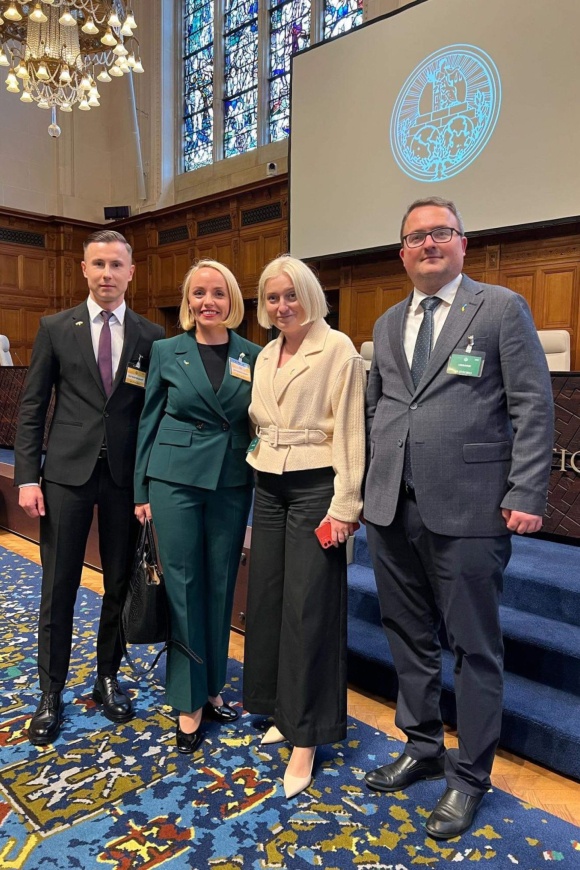Letʼs start with the dispute between Ukraine and Russia over the incorrect reference to the Convention on the Prevention of Genocide. Why is this case important for Lithuania?
Lithuania survived two Soviet occupations, the last of which lasted almost 50 years. Ever since the Soviet Union, the Russians have been trying to impose this narrative that there was no military occupation and annexation of Lithuania. It is important for us to support Ukraine in its legal struggle against the alternative "international law" that Russia is trying to spread. Putin directly invoked the concept of genocide to justify an invasion that had no legal basis. Itʼs important to say that this is not normal, and international law allows states to defend themselves.
When I teach law students, I explain to them that the Genocide Convention is an important and fundamental document for the international community. All signatory states have an interest in ensuring that this treaty is implemented and interpreted correctly. And Russia is using it to justify the aggression that the UN General Assembly has recognized.
It is said that international criminal law is divided into pre-Nuremberg and post-Nuremberg stages. I think it will be the same here. This is a renaissance of international law, and it will definitely not be the same as it was before the Russian aggression against Ukraine.
Consolidated cooperation of countries to support Ukraine is important because it is states that create international law. We are doing many things for the first time. This case at the International Court of Justice, the tribunal, sanctions, confiscation of frozen assets ― this is an uncharted area. Therefore, we must approach this responsibly. But we must also be brave, because we are dealing with a permanent member of the UN Security Council.
If the court recognizes its jurisdiction, will Lithuania participate in the hearings and consideration of the case on the merits?
Letʼs hope that we have the decision on the admissibility of the case quite fast. We have already discussed with our Ukrainian colleagues what contribution we can make during the merits of the case. Since many countries have submitted their interventions, we have to distribute who will pay attention to what. Because this is a huge case.
You were also at a meeting of the group in The Hague discussing the format of the future aggression tribunal. Can you tell us a little more about this?
This group was created at the initiative of Ukraine. Its idea is to bring together experts in international law to discuss the technical, procedural and legal aspects of establishing such a tribunal. There are no politicians there. These are experts with experience in various tribunals, with theoretical knowledge of international criminal law and public international law. Initially, the group included only those countries that were talking about a full-fledged international tribunal. Subsequently, it was joined by countries proposing other formats. But the main thing is that all the countries in the group agree that a tribunal to punish Russian aggression is needed, and the only question is what exactly it should look like.
Gabija Grigaitė-Daugirdė and the agents of Ukraine at the UN International Court of Justice — Anton Korynevych (far right) and Oksana Zolotaryova.
LinkedIn / «Бабель»
Now there are two options: a fully international tribunal based on the recommendation of the UN General Assembly and integrated into the national system of Ukraine. In the second case, it will be necessary to change the Constitution of Ukraine, and such a tribunal will not be able to overcome the immunity of the president.
During our last meeting, we had another proposal ― to transfer Ukrainian jurisdiction to a third state. There is a legal mechanism that allows one country to transfer its criminal proceedings to another at any stage, from investigation to verdict. This is how it happens, for example, in cases of transnational organized crime. And this idea has one advantage: there is no need to change the Ukrainian Constitution.
But personally, I donʼt think this will change the situation dramatically, because it will not solve the issue of immunity, since we will still have the jurisdiction of a third state.
What is the role of the International Center for the Investigation of the Crime of Aggression (ICPA) in the future tribunal?
This center enhances the legitimacy of all domestic investigations of the crime of aggression, as it is possible to attract international expertise and unify definitions and terms. This is important because countries, for example, have different definitions of the crime of aggression. And if countries agree on it in the ICPA format, there will be no such problem at the tribunal.
The idea of ICPA was that we should already be collecting evidence that cannot be challenged later, because it was collected in accordance with the procedures.
Can Ukraine transfer jurisdiction to one of the countries that is currently investigating Russian aggression as part of the ICPA?
The tribunal can be established based on the jurisdiction of the JIT or ICPA countries that have already started investigating the crime of aggression.
Do all the representatives of the countries in the group creating the tribunal agree that Putin should stand trial?
Everyone agrees that Putin and his entourage should be responsible for the aggression. The difference is when exactly. There are countries that believe that immunity can be removed. Others say that we will be able to issue an arrest warrant only when Putin leaves the presidential office.
There are already warrants for the arrest of Putin and Lvova-Belova, issued by the International Criminal Court. It operates according to the Rome Statute, which is an international document signed and ratified by various states. So we see that international law works, and immunity doesnʼt mean impunity.
The decision should be effective, not symbolic, Ukrainians should see that justice exists. If Kyiv decides that the issue of immunity should not be an obstacle, Lithuania will support Ukraineʼs position. If you create a toothless tribunal, there will be no result. So we hope to have a tribunal with teeth. And with big ones!
There is an opinion that Ukraine will not be able to get votes for the resolution in the General Assembly on the creation of a full-fledged tribunal. Can we forget about the idea of a full-fledged tribunal?
The issue of the tribunal can be brought to the UN General Assembly only once. And the first time you have to get the required number of votes.
In my opinion, talk about whether Ukraine will get the required number of votes is speculation. Because we will never know for sure until the moment of voting. We need to work, communicate with countries, explain, and be open to discussion.
I talk about the tribunal at every meeting with representatives of other countries. Sometimes there are rumors that a country will not vote for a full-fledged international tribunal, and then you realize in conversation that this is not true. I think that this discourse is designed to deprive [Ukraine] of confidence. And we shouldnʼt forget that in the General Assembly, it doesnʼt matter whether a country is big or small, because each member has one vote. So if small countries are ready and there is cross-regional support for the tribunal, I would say that the voting can be successful.
Gabija Grigaitė-Daugirdė during the hearing of the case of Ukraine against Russia at the International Court of Justice of the United Nations in September 2023.
ICJ / «Бабель»
Ukraine has already done this several times. For example, when we voted for the creation of the Register of Damages or for the Peace Formula. There were also rumors then that Ukraine would not get enough votes, but it did. It is only necessary to have a clear road map for the tribunal and to carry out explanatory work.
If a tribunal has to be created based on the jurisdiction of a third country, is Lithuania ready to accept it?
The Netherlands has already proposed The Hague for the tribunal in any format. Competing with The Hague would be an honor for Vilnius, but I believe that the tribunal in The Hague is more appropriate.
It is important to find the version of the tribunal that will overcome immunity, because this is the only way to stop Putin. If we donʼt do this, the threat to international peace and security of the Baltic states, including Lithuania, will only grow. Putin wasnʼt stopped in Chechnya, then in Georgia, and in the end he wasnʼt stopped in Crimea either. Therefore, a tribunal is needed to undermine the legitimacy of his authority. We need an accusation of the crime of aggression and a clear message to the Russian people. It should be a tribunal that will condemn the imperial ideology of "the Russian world".

